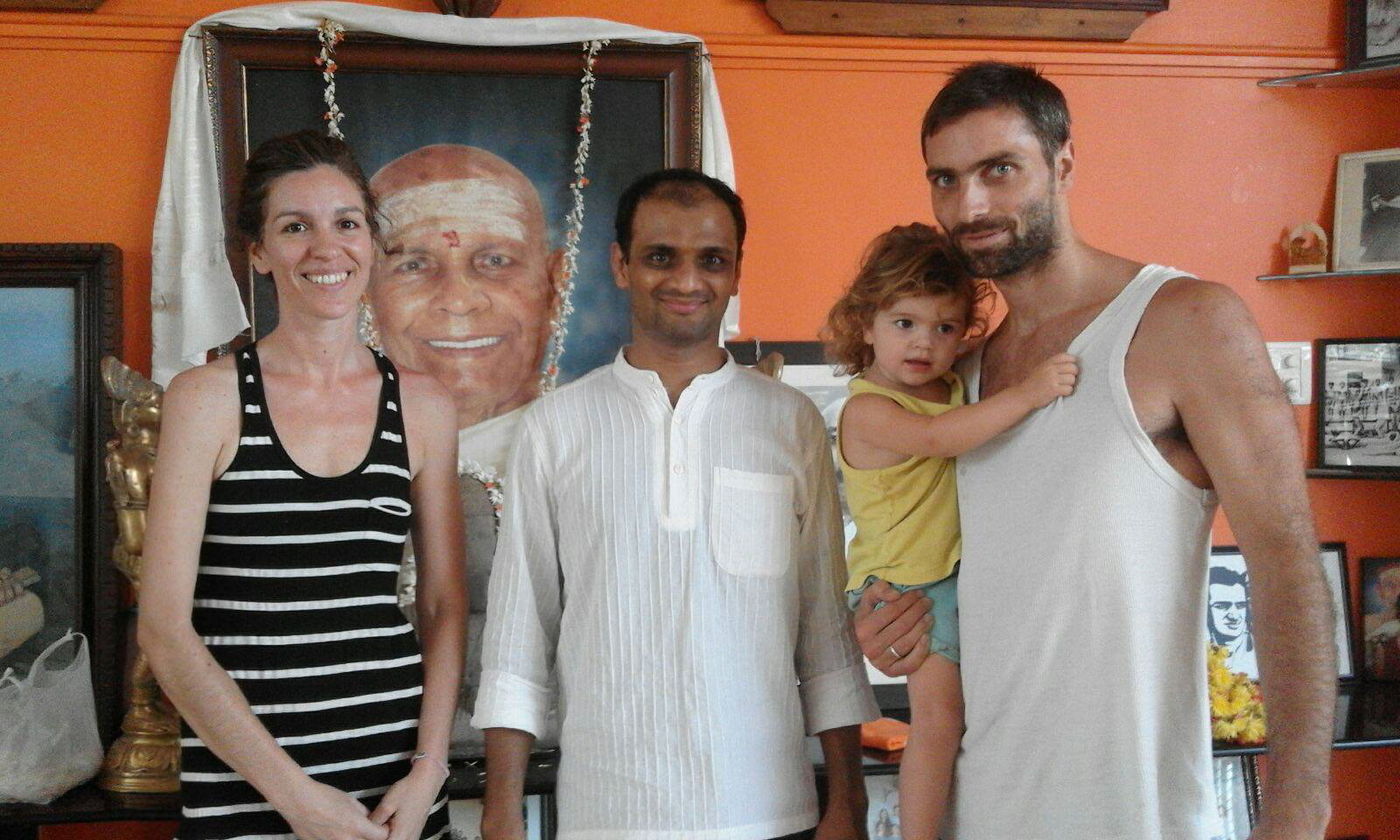Carola es practicante y profesora de Ashtanga.
Co-fundadora de Ashtanga House, junto con su compañero Matías de Biedma.
Y mamá de Sara y Bruna.
♥
Carola is an Ashtanga practitioner and teacher.
Co-founder of Ashtanga House, together with her partner Matías de Biedma.
And mom of Sara and Bruna.
•••••••••••••••••••••••
For English version, and more photos, keep scrolling!
• Contanos cómo te convertiste en profesora de Ashtanga.
Mi maestro en ese entonces me pidió que enseñe. Había aprendido a enseñar con él durante un año, era una especie de Teacher Training. La verdad es que cuando comencé a practicar Ashtanga nunca me imaginé el lugar y la cantidad de espacio que ocuparía en mi vida y en mi familia. Yo trabajaba como diseñadora gráfica free-lance y estaba muy satisfecha con mi trabajo, no con el modo, porque vivía estresada, y esa fue una de las razones por las cuales comencé con esta práctica, pero no buscaba cambiar de rubro. Estaba bastante satisfecha con mi trabajo pero muy angustiada y estresada… Además siendo free-lance trabajaba muy sola y cada vez me volvía más ermitaña, cada vez más me costaba relacionarme con otros. Pero uno mira al alrededor y todos están así y uno cree que eso es lo “normal”, que esa es la manera de trabajar y qué le vas a hacer… Comencé a practicar de noche, para obligarme a parar de trabajar y soltar la computadora. Tuve que cambiar muchos, demasiados hábitos en mi vida. No fue algo que planeé, simplemente estaba en un lugar de mucho dolor, de mucha angustia, de mucho cansancio y hartazgo en relación al modo en que estaba viviendo. Creo por experiencia propia que el yoga sólo puede entrar por una grieta profunda, por un dolor insoportable que haga que realmente quieras, necesites cambiar. También en ese entonces me diagnosticaron hipotiroidismo y me shockeó la manera en que el stress puede afectar tu cuerpo hasta tal punto en que ciertos mecanismos que se sacrifican cuando estás en modo stress, luego no vuelven. Creo que ese fue mi primer contacto con mi cuerpo, siempre fui muy mental, de actividades más mentales que físicas y nunca presté demasiado atención al cuerpo sino simplemente como un vehículo que siempre respondía hasta que un día dejó de hacerlo. No podía creer que iba a necesitar medicación de por vida y que para colmo todos me dijeran que era bastante común. Hacía poco había dejado de fumar, algo que había hecho la mitad de mi vida por ese entonces y algo que creí que nunca jamás iba a dejar de hacer porque me definía. Y cuando lo dejé sentí que no todo estaba dicho sobre mí, que yo no sabía todo sobre mi ni de todo lo que era capaz, que todavía podía cambiar. Fue la primera vez en mi vida que sentí eso. Luego vinieron tantas otras sensaciones así con yoga a las cuales estoy eternamente agradecida. Soy una persona muy apasionada y cuando algo me interesa me dedico en cuerpo y alma a eso. Con yoga descubrí por primera vez que había algo que no podía resolver, descubrir, entender por más que le ponga todo el esfuerzo y dedicación, que simplemente tenía que dejar que se desenvolviera, que operara en mi y yo tomar un rol pasivo, de observación donde la dedicación y esfuerzo pasaran por otro lado, justamente por ponerme disponible dia a dia para que operara en mi, sin esperar un resultado.
Compartir esta práctica que literalmente me salvó la vida es una de las cosas que más me hace feliz. Poder vivenciar y acompañar la transformación en otros es realmente especial, me siento muy afortunada.
• ¿Cómo te ayuda tu práctica de yoga a conectar con tu feminidad?
Mi práctica es una herramienta de autoconocimiento en primera instancia. Me ayuda a entrar en mi cuerpo, sentirlo, observarlo, ver dónde estoy, qué cosas me hacen bien y qué cosas no. Me saca de mi mente y de las historias que mi mente me cuenta sobre mi.
Tuve un comienzo de muchas lesiones con la práctica, creo que tenía mucho que desintoxicar y mucho por sanar y eso tomó forma de muchas lesiones. También mi forma de encarar las cosas siempre fue muy activa, aguerrida, masculina podría decirse. Entonces empezar a sanar tuvo mucho que ver con conectar con otra manera de hacer, de acercarme a las cosas. De correrme un poco de hacer, lograr, resolver, avanzar. Y la práctica me mostró eso inmediatamente. Empezar a conectar con cualidades más nutritivas, restaurativas, compasivas y de aceptación; eso se volvió mi práctica más grande y estuvo bastante involucrado en la manera en que yo vivía la femineidad y en gran parte la visión que yo tenía de mi madre o de lo que era ser mujer para el caso.
• ¿Cómo fue y cómo es a lo largo de tus 37 años, tu relación con la feminidad?
Recuerdo desde chica que me molestara ser niña, me sentía más débil o afuera de ciertas cosas. Todo lo divertido lo hacían los varones y yo estaba siempre con mis primos y amigos varones, trepándome a todos lados, llena de moretones, siempre fui muy varonera y siempre me sentí como fuera de lugar, ni cómoda con las nenas porque me aburría, ni cómoda con los varones porque tampoco ellos querían jugar con nenas. También fui a una primaria de escuela católica donde éramos solo mujeres.
En mi casa curiosamente también éramos solo mujeres. Mi mamá, mi hermana y yo. Mis padres se separaron cuando yo tenía un año así que realmente nunca tuve una figura masculina en el día a día. Pero justamente por eso creo que mi madre pretendía cumplir ese rol o como ella dice, no le quedaba otra. Era una mujer muy fuerte, muy coqueta con su maquillaje, su ropa, sus carteras y sus tacos, pero muy masculina, muy propia de los ‘80. Una persona que amaba mucho su trabajo en grandes empresas y calculo que tuvo que competir con muchos hombres para poder llegar donde llegó. Una mujer muy independiente, muy fuerte, muy luchadora. Es el claro ejemplo de mujer autorrealizada, se hizo de muy abajo y luchó mucho en su vida, y todo lo que logró fue el resultado de mucho esfuerzo. Su imagen tuvo un gran impacto en mí, como también su visión de la vida como lucha. También fue una persona que desde donde yo lo veía, le costaba mucho relacionarse con los hombres, desde un lugar de mucha exigencia para con los otros.
Entonces para mi la idea de ser mujer estuvo relacionada con demostrar que no era menos. El viejo dicho de “puedo hacer lo mismo que vos y sangrando”. Como hasta una negación de mi femineidad, lo percibía como debilidad.
• ¿Qué significa para vos ser feminista hoy? Y qué es para vos ser una mujer fuerte?
Mi práctica me ayuda a observar las limitaciones de mi cuerpo y también todas sus posibilidades. Y con esto me refiero a que me ayuda a conectarme con que soy algo que está mucho más allá de este cuerpo, no soy sólo un cuerpo de mujer. Ese creo que es otro proceso más que estoy atravesando de desidentificación. Pero creo que sólo pude llegar ahí al zambullirme entera en mi cuerpo y eso implicó primero un largo proceso de reconocimiento de mi poder femenino.
Para mi hoy ser una mujer fuerte es aquella que se permite no poder, fallar. Aquella mujer que se presenta ante al mundo en su máxima crudeza, sin pretensiones ni presiones, ni externas ni internas. Una mujer que es fiel a sí misma, a su verdadero Ser y no a una idea que tenga sobre lo que ella misma debería ser o quisiera ser. Una mujer compasiva consigo misma, llena de amor. Eso siento en los momentos más difíciles con mi hija, cuando ella más me necesita, cuando a veces está en el medio de un berrinche y yo siento que logro contenerla pese a que me cueste, siento que mi corazón se agranda en ese momento, siento físicamente más espacio abrirse. Eso para mi hoy es sinónimo de fortaleza.
• ¿Qué portales o niveles de percepción como mujer te abrió tu primer embarazo?
Mi primer embarazo me conectó con mi mundo emocional. Sentí como algo se abrió y nunca más volvió a cerrarse. Recuerdo que no entendía, que me sentía tan abrumada por tanta emocionalidad, fue demasiado. Calculo que no podía haberse dado de otro modo. Y nunca más se cerró, nunca más volvió a su estado anterior.
• ¿En qué se diferenciaron tus dos embarazos?
Mi segundo embarazo me encuentra más madura con respecto a muchas cosas, mi pareja, mi familia, mi práctica y especialmente conmigo misma. Me encuentra viviendo en otro país también, casi en otra vida, otro mundo, podría decirse. Creí que ya sabía de qué se trataba estar embarazada pero no. Cada embarazo es un proceso único, es una persona distinta con distinta energía la que está dentro tuyo y esa alquimia produce algo único, cada vez. En este embarazo sentí que pude cruzar un umbral muy grande, de mucha información, mucha sabiduría guardada muy en lo profundo. Un umbral que habilitó un grado de conexión increíble y mucha paz. Hubo algo que leí apenas entrado el embarazo que decía “que puedas hacer algo por vos sola no significa que tengas que hacerlo” y me tocó una fibra con respecto al pedir ayuda, al no tener que, a poder decir que no. Mi primer embarazo fue hermoso, sin complicaciones, liviano, también de muchísimo aprendizaje pero más relacionado con aprender a soltar. En este no me resistí con eso y fue algo que se dio bastante pronto, por suerte. Sabiendo que solo soltando podés abrirte a cosas nuevas. En mi primer embarazo me exploré a mi misma y no al “tema”. Fue la primera vez que decidí no leer o estudiar sobre eso que estaba sucediendo, exploré la confianza, la fe, conceptos con los cuales no me relacionaba tan fácilmente. Me costaba no prepararme para algo pero fue muy beneficioso, aprender a correrme y dejar que la vida opere, confiar en la vida. Aprendí mucho de esa resistencia. Resistencia a sentir de más, a desbordarme emocionalmente, a ser débil, a que me afecte… Siento a veces que es muy fácil “entender” ciertos procesos intelectualmente o desde afuera, que creemos que ya lo sabemos pero si no lo experimentas, no lo corporizas, no lo atravesas hay un nivel de entendimiento que se escapa. Y todos tenemos distintos niveles, distintas necesidades, no está ni bien ni mal que necesites más o menos intensidad para “entenderlo”.
Mi segundo embarazo comenzó con mucha frustración, estaba viviendo un momento de mucho crecimiento y tenía varios planes pero la vida tenía otros para mi y me costó aceptar ese timing al principio. Estaba en un momento en el cual me gustaba mucho estar conmigo misma y mis rutinas, enseñar, mis prácticas. Me costó ese proceso inicial del embarazo donde sentís que dejas de ser “vos”, como te conocías, donde ya no estás en un terreno de familiaridad con tu mente ni tus emociones. Esa sensación de no poder contar “conmigo misma”, con esa vieja idea de lo que yo creí que era, me expuso a una fragilidad, a una debilidad. Me sentí muy expuesta y eso me incomodó. Todo el proceso de observar esa incomodidad, de ver de dónde venía ese miedo, ese rechazo a mi propia fragilidad fue un viaje muy profundo en el cual pude encontrar una fortaleza inmensa dentro de mi. Una fortaleza que ni siquiera era mía, que yo no la había ganado ni era resultado de mi propio e individual esfuerzo sino una fortaleza universal, sentí que en mi vulnerabilidad yo era todas y cada una de nosotras. Y me sentí protegida y contenida. Respaldada, acunada. Comencé el proceso de maternarme a mi misma. Ahora que ya soy madre me doy cuenta de lo difícil que era para mi concebir la idea de darme la misma cantidad de amor, comprensión y paciencia a mi que la que le doy a mi hija. Poder desear y procurar para mi misma lo mismo que para ella fue muy sanador.
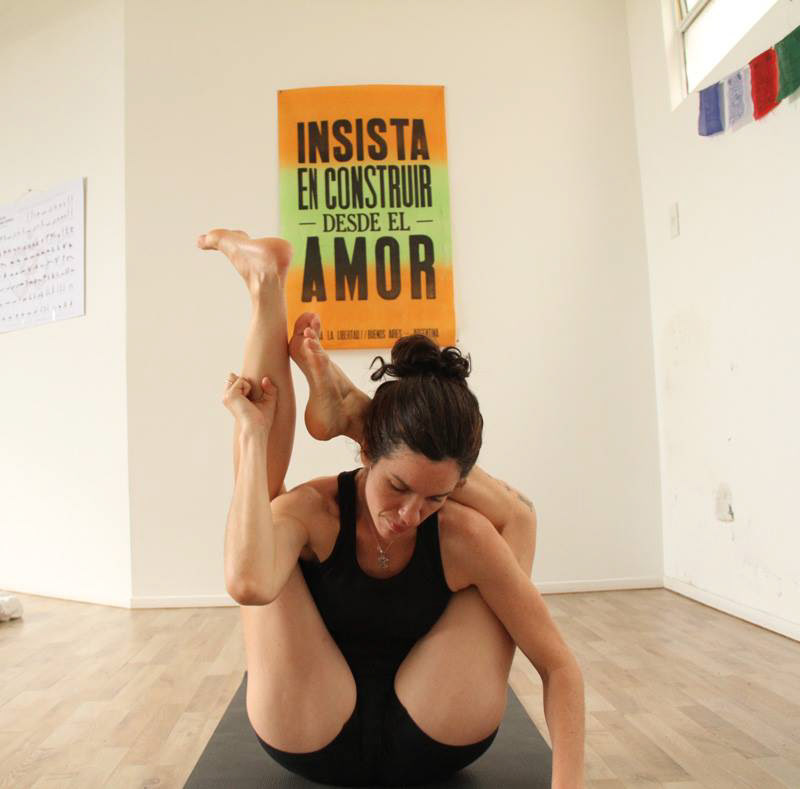
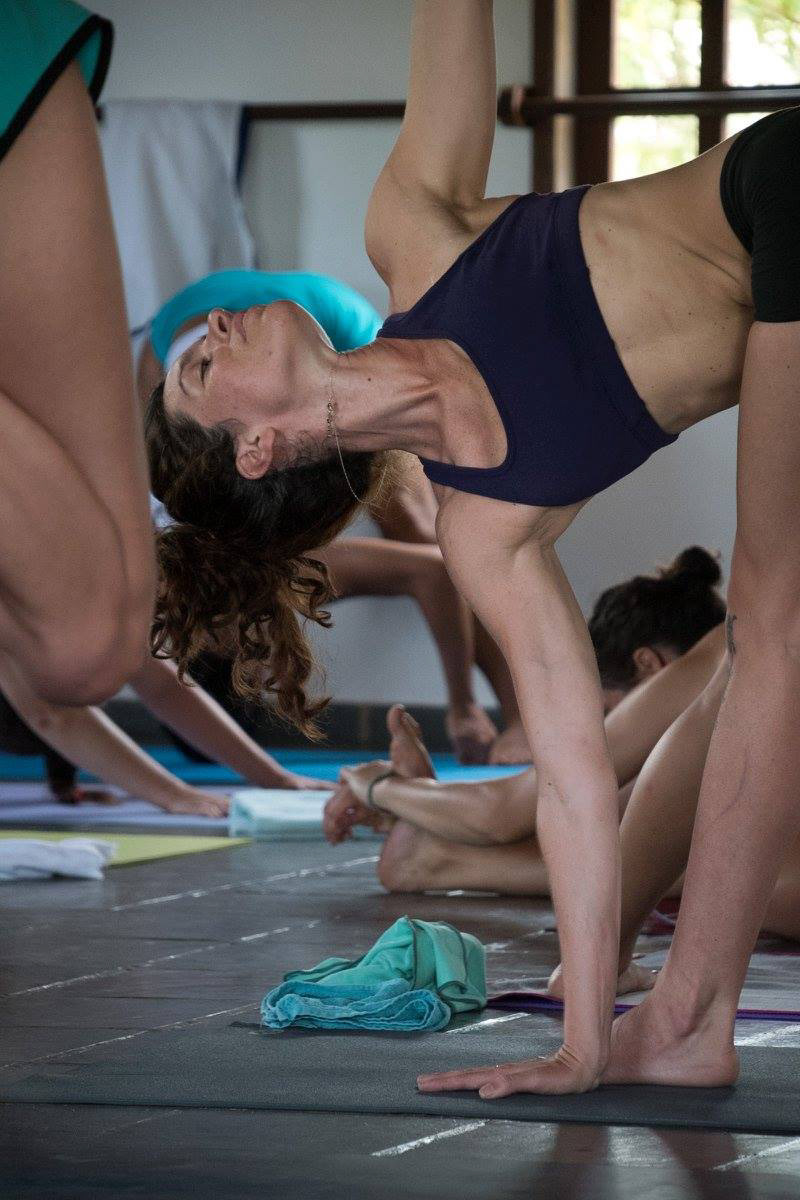
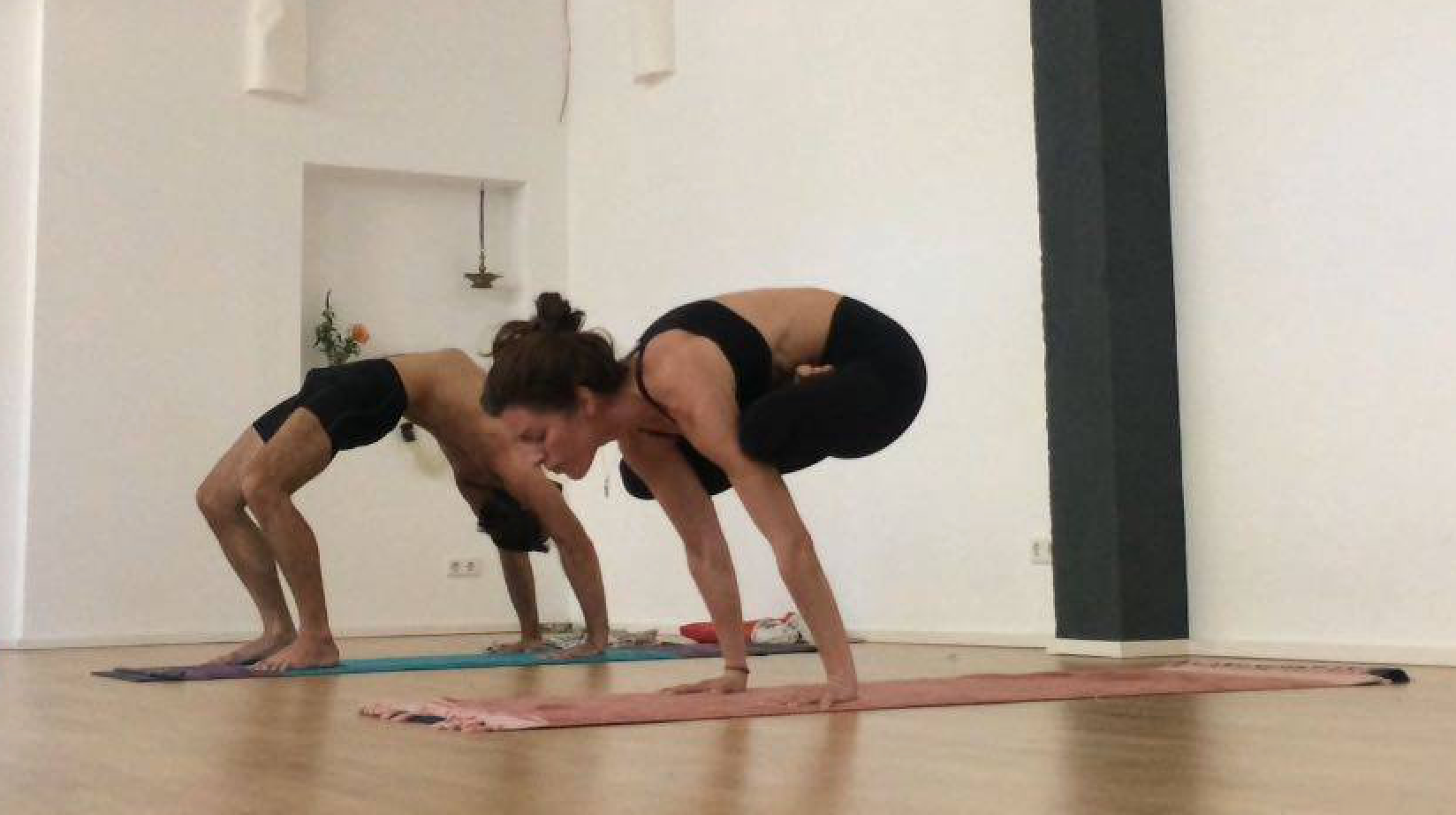
• ¿Cómo fue la experiencia del parto?
Surreal, mística. Fue la experiencia más espiritual que tuve en mi vida. Me sentí atravesada por una fuerza muy grande, algo imparable, incontrolable, poderoso. Es muy difícil de narrar en palabras porque justamente poder parir implica un grado enorme de desconexión-conexión. Es una experiencia única, un portal. Creo que no hay otra situación donde sienta tanto a mi mente resistirse pero sin lugar dónde ir. Es un momento donde pude realmente conocerme, conocer mi poder, mis limites. Fue un momento muy especial con mi pareja, de mucho amor. Es realmente increíble, mágico que podamos vivenciar algo así. Y empezar la maternidad pudiendo atravesar un parto respetado es una manera de darle a las mujeres el poder, la confianza y la fuerza para encarar la enorme tarea de criar un niño, para encontrar la fuerza para permanecer despierta la noche entera acunando a un bebé que llora. La fuerza para responder a un niño enojado con amor y paciencia. Y lo que siento que la sociedad no entiende (o más bien no quiere permitir) es que cambiando esto cambias la sociedad entera. Imagina la sociedad que podemos crear criando hijos con madres sin miedo!
• ¿Por qué crees que la sociedad en la que vivimos, les niega o aleja a las mujeres del empoderamiento y placer durante el parto?
Miedo. Esta sociedad nos quiere viviendo en el miedo. Miedo a morir, a no tener, a fracasar, a sufrir.
• ¿Cómo fue el post parto con Sara? ¿Cómo imaginas el que está por venir?
Con Sara no tuve registro del postparto. No tenía la menor idea de qué se trataba, sólo creía que te podías deprimir y no quería eso. La verdad es que no descansé, estaba tan ansiosa por volver a recuperar mi cuerpo, mi vida, mis actividades, mi espacio privado personal. Tampoco sentí la necesidad de hacerlo, no fue que me lo impuse. De hecho, hubo varias cosas que quería hacer y me limité bastante! Como en el embarazo me había costado tanto desacelerarme apenas pude, volví a hacer todo lo que me gusta, soy bastante inquieta, de naturaleza más bien fogosa y muy determinada así que en ese momento me costó bastante conectar con algo restaurativo. Eso viéndolo desde ahora me parece una locura pero de vuelta, no lo juzgo, lo comprendo, entiendo de dónde venía, del proceso que era parte. Hoy estoy en otro lugar y también este postparto me encuentra con muchas ganas de cuidarme, de mimarme, de respetarme, de nutrirme. Hoy entiendo la importancia de poder descansar, de respetar los diferentes momentos, las diferentes etapas, no apurarlas. Hoy entiendo que ya nada será igual así que tampoco tengo apuro por “volver” a nada, no hay nada a lo que volver. Sólo algo nuevo por descubrir. Quiero descansar y recuperarme para poder estar lista para mi nueva vida, para mi nuevo yo. Quiero no perderme esas hermosas primeras semanas de un bebé, no quiero sentir presión.
• ¿Qué significa para vos, como mujer, tener una hija?
Eso es algo que estoy descubriendo recién ahora, con sus 4 años. No me entusiasmaba tanto la idea de tener una nena y siento que es una sensación bastante insertada en la sociedad en general. Y para colmo, me tocó una nena hermosa y coqueta que ama los vestidos, los volados, los moños, las princesas y todo rosa. Y al principio intenté lucharlo todo lo que pude pero por suerte entendí que eso también era imponerle algo mío y que si realmente quería enseñarle el inmenso poder de ser ella misma tenía que respetarle verdaderamente todas sus elecciones. Hasta las princesas! Hoy ella me hace cuestionarme todo en lo que creo y voy a estarle eternamente agradecida por eso. Me hizo repensar la femineidad, qué visión del cuerpo quiero enseñarle. Me encanta tener una hija mujer, es muy sanador.
• ¿Qué consejos le darías a tu hija en el futuro, si es que decide tener hijos?
Espero poder acompañarla en todos los procesos de su vida sin entrometerme, es algo que realmente me gustaría lograr. Quiero poder escucharla profundamente más que darle consejos. Quiero poder darle un espacio de refugio, contención, sin juicios.
• Como profe de Ashtanga, ¿cómo acompañas a las mujeres que practican embarazadas y con bebés recién nacidos?
Trato a las mujeres embarazadas del mismo modo que a los demás practicantes, como personas únicas. Esa es la maravilla de enseñar el método mysore, cada persona que entra por la puerta es distinta. Porque creo honestamente que la práctica de Ashtanga Yoga es para todos, para todos los cuerpos, en todos los estados. Esta práctica puede acompañarte en todas las etapas de tu vida si aprendes a aplicarle la intención correcta. Para mi es una herramienta de autoconocimiento, me sostiene, es mi ancla e incluye mucho más que el asana. Siempre tengo eso donde volver, siempre puedo, por lo menos, sentarme y observar mi respiración.
Es importante para mi, no imponerles nada. Permitirles recorrer su propio camino de descubrimiento. Lo cual se parece bastante a cómo enseñamos a todos los demás en el shala! Así es cómo mis maestros me enseñaron. Mi primer embarazo pude practicar con Matthew y Carla Vollmer y el segundo con Sharath Jois en Mysore. No me gusta prohibirles nada ni decirles lo que tienen que hacer. Obviamente, hay lineamientos y varían de principiantes a practicantes con más experiencia. Comparto mi conocimiento sobre qué cosas son beneficiosas y cuáles definitivamente no, pero dejo la responsabilidad de su práctica a cada mujer. Para mi es importante que ellas puedan tomar sus propias decisiones, equivocarse, probar, hay un pozo de sabiduría inmenso ahí. Y el embarazo es un periodo tan abrumador hoy en día, donde todos tienen algo para decir al respecto que es difícil acallar todo ese ruido externo. Por eso para mi es importante que puedan desarrollar un lugar de silencio, de conexión, de aprender a escuchar a su cuerpo y al de su bebé.
Y me encanta cuando retoman su práctica. Valoro enormemente, por propia experiencia, el esfuerzo que hacen por venir al shala. Es difícil volver a la práctica, encontrar el tiempo, la manera, pero disfruto mucho de acompañar a las mujeres en ese proceso de redescubrimiento de su nuevo cuerpo, de su nuevo yo, de su nueva fortaleza que encuentran en todo el caos. Sé muy bien que es duro al principio pero me encanta acompañar y atestiguar ese proceso.
• ¿Qué libros recomendás a otras mujeres?
En general prefiero no recomendar libros por esto que descubrí de no investigar afuera tanto para poder dejar un poco de espacio abierto a la intuición, a lo que surge dentro de una misma, a la propia experimentación. Pero la realidad es que soy una ávida lectora e investigadora y hay varios libros que son muy inspiradores para mi. Ginecología Natural de Pabla Pérez San Martín; Cuerpo de Mujer, Sabiduría de Mujer de Christiane Northrupe; The Fourth Trimester de Kimberly Ann Johnson; Yoga Sadhana for Mothers, entrevistas a mujeres ashtangis compiladas por Sharmila Desai y Anna Wise; y uno que no es solo para mujeres pero quiero mucho, Practicing Peace de Pema Chodron.
• ¿ Qué mujeres te inspiran cotidianamente?
Carla Vollmer es una mujer que me inspira como mujer, como madre, como amiga, maestra. Es un referente muy importante para mi, una persona que llevo muy profundo en mi corazón y me siento afortunada de decir que es mi amiga y maestra. Y es una mujer real, sin pretensiones, sin poses, honesta, amorosa y extremadamente generosa. Pema Chodron es otra mujer de la cual aprendí muchísimo, es alguien que leemos e intentamos practicar mucho en casa. Mi doctora ayurvédica, Carmen Frigerio que me acompañó en mi primer embarazo fue muy inspiradora y muy querida también para mi. Y más que nada, muchas de mis amigas me inspiran día a día, me siento afortunada y agradecida de estar rodeada de mujeres así. Me da mucha felicidad ver mujeres más jóvenes con todo este proceso tan claro, tan fuerte, algo que a mi me llevó años pero siento que hay una nueva generación gestándose, que no tiene vergüenza de sentir, mujeres que no compiten, que se respaldan y se impulsan. Es inspirador y esperanzador.
• ¿Qué te dirías hoy, a tu yo pasado, al momento de tener la primera menstruación?
Que no tenga miedo, que nada se acaba ahí, que no es algo que hay que esconder o avergonzarse. Yo no tenía ni idea que había tanta información ahí, todo lo que sabía sobre mi ciclo es que estaba relacionado con mi fertilidad y siendo tan joven, le tenía terror. No quería saber nada con eso y la pastilla era la solución mágica… y mientras tanto “sufrir” los hormonazos, pensar que me volvía loca una vez al mes, pero muy dentro mío intuir que eso que explotaba en ese momento escondía mucha verdad.
Le diría que al contrario, que se abre un portal a un mundo nuevo, de conexión, único, mágico. A mi hija le digo todo el tiempo que tenemos “panzas mágicas” porque es así, somos magas.
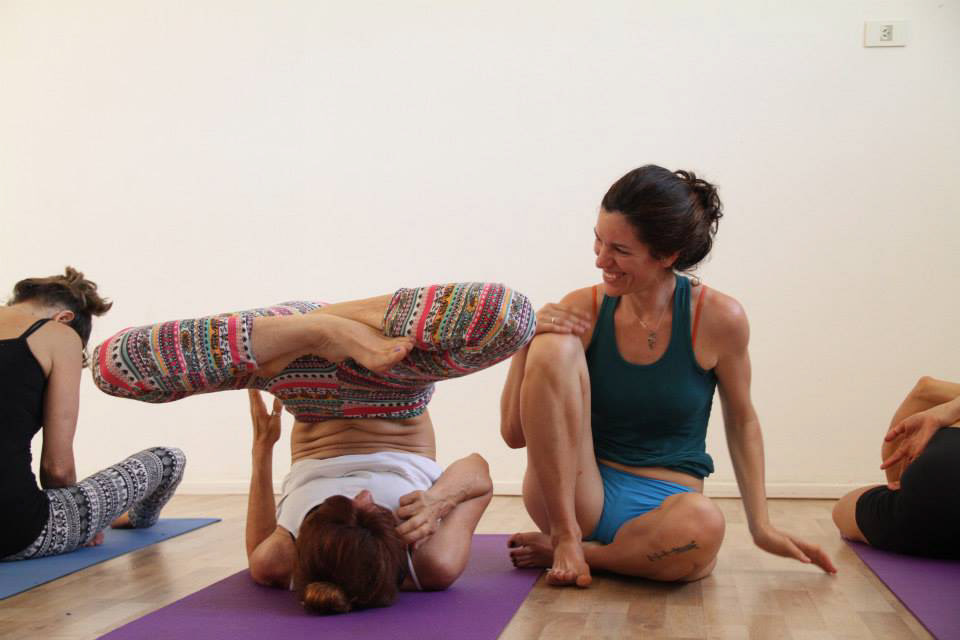
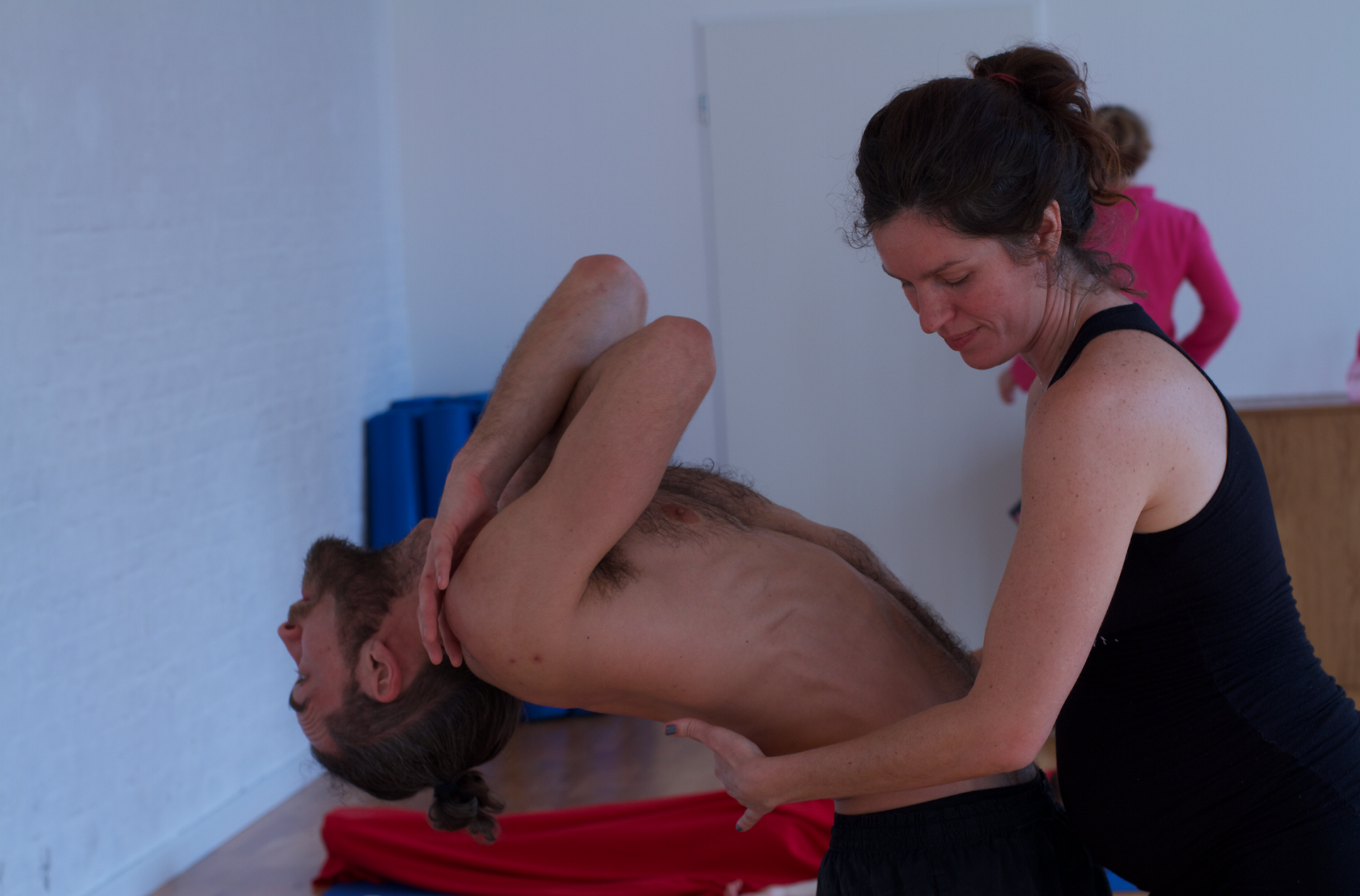
••••••••••••••••••••••••••••••
ENGLISH VERSION
• Tell us how did you become an Ashtanga Yoga teacher?
My teacher back then asked me to teach. I had learned with him during a year how to assist in some sort of TTC. Truth is when I started to practice Ashtanga I’ve never imagined the place it would take in my life and my family. I used to work as a free-lance graphic designer and I was pretty satisfied with it. Not with the way I used to work because I was constantly stressed out and that was one of the main reasons I started with this practice but I definitely wasn’t looking to change my career. I liked what I was doing but I was very anxious and distressed. Even more, being a free-lance I used to work alone, isolated; relating to others was becoming increasingly challenging. But you look around and everybody is like this and you start thinking this is the norm, this is they way you are supposed to work and you just get on going with it. So, I started to practice in the evenings as a way to find a full stop to my work day. I had to change so many patterns in my life. It wasn’t something I planned, I just was in a very painful place, with sorrow inside and I was tired sick of the way I was conducting my life. I believe, out of my own experience, yoga gets in through a deep wound, an unbearable pain that truly motivates you to change. At the same time, I was diagnosed with hypothyroidism and I was shocked with how stress can affect your body until a point where certain functions -which are sacrificed on stress mode- don’t return to their previous state. I believe that was my first encounter with my body talking to me, saying this is enough. I’ve always been a mental person, more inclined to mind activities rather than physical ones and I’ve never paid too much attention to my body except only as an ever-working vehicle until it stopped doing so. I couldn’t believe I was going to need medication for the rest of my life, moreover everybody was telling me it was pretty normal. I had quit smoking recently, something I did for half of my life by then and something I thought I would never quit because it defined me. And when I quit I felt not all was written about me, I felt I didn’t know everything about myself, that I didn’t know all I was capable of and that I was still able to change. It was the first time in my life I felt that and it was huge! Then many alike situations happened with yoga and I’m forever grateful to it. I’m a passionate person and when I’m hooked on something I fully commit to it. With yoga I discovered for the first time there was something I couldn’t resolve, discover, understand with only effort and dedication, that I just needed to let it evolve, work on me and “I” was supposed to take a passive role, observing, where dedication and effort were resignified, where I was meant to make myself available on a daily basis to let its magic work on me, without expecting a result.
Sharing this practice that literally saved my life is one of the things that make me truly happy. Being able to witness and hold the space for this transformation to happen in others is truly special, I feel very lucky.
• How does your yoga practice help you in connecting with your femininity?
First of all, my practice is a tool of self inquiry. It helps me to get inside my body, feel it, observe it, to see where I am, which things are good for me and which ones don’t. I takes me out of my mind and the stories it tells me about myself.
I had a beginning with a lot of injuries. I think I had a lot to detox and a lot to heal as well and that took the shape of injuries in my case. The way I used to approach things in my life have been always very active, fierce, kind of masculine one may say. So starting to heal had a lot to do with connecting with a different way of doing, of approaching things, events, people. Kind of stop doing, achieving, resolving, moving forward. And the practice showed me that right away. My biggest practice was learning to connect with more nutritious, restorative, compassionate qualities of acceptance. That was connected to the way I was living my femininity and also the image I had of my own mother or what it meant to be a woman.
• How was it and how is it through your 37 years old life your relationship with the femininity?
Since I was a child I remember being annoyed with being a girl, I felt treated as weaker or being left out. All the fun belonged to the boys so I tried to hang around my male cousins and friends, climbing trees, always bruised; I was a tomboy! However I went to a catholic primary school and at home we were only women. My mom, my sister and I. My parents got divorced when I was one year old so I’ve never really had a manly figure in my day to day life. And exactly because of this my mom tried to fill in that role; or as she says, there was no other option. She was a very strong and stylish woman, the full package: makeup, clothes, handbags and high heels though quite masculine, appropriate from the 80’s. Someone who loved her job in big companies and I think she had to compete against several men to get where she got. A very strong and independent woman, a fighter. It’s the clear example of self-realized woman. She had quite a rough and poor beginning and had to fight for everything in her life. Everything in her life was the outcome of huge effort. Her image had a profound impact on me, as her idea of Life as Struggle. She was also a woman who didn’t have it easy relating to other men, always from a demanding place with the other person.
So for me the idea of being a woman was related with showing I wasn’t less than the others. The old saying “I can do the same you do but bleeding”. Like a denial of my own femininity, I perceived it as a weakness.
• What does it mean to be a feminist today? And what is a strong woman according to you?
Mi practice helps me observe the limitations of my own body but also all its possibilities. And with this I mean it helps me connect with the idea that I’m that which is beyond my body, that I’m not only a female body. This is another process I’m going through of disidentification. But I believe I could only reach that place through diving completely into my body and that implied a long process of identifying my feminine power.
For me today being a strong woman is one who allows herself to fail, to not be able to do. That woman who presents herself in front of the world in its rawness, with no pretensions, no pressure, not from the outside nor from within. A woman who is true to herself, to her true Self and not to an idea that she has about what she herself should be or would like to be. A compassionate woman towards herself, full of love. I feel that in the most difficult moments with my daughter, when she needs me the most, when sometimes she is in the middle of a tantrum and I feel that I manage to contain her even though it challenges me, I feel that my heart expands right there, I feel physically more space opening. That, for me today, is synonymous of strength.
• What portals or levels of perception as a woman opened up your first pregnancy?
My first pregnancy connected me to my emotional world. I felt like something opened and never closed again. I remember that I did not understand, that I felt so overwhelmed by all this emotionality; it was too much. I reckon it could not have been otherwise. And it never closed again, it never returned to its previous state.
• How are your two pregnancies different?
My second pregnancy finds me more mature in many things: my partner, my family, my practice and especially with myself. It finds me living in another country too, almost in another life, another world, you could say. I thought I already knew what pregnancy was about but no. Each pregnancy is a unique process, it is a different person with different energy that is inside you and that alchemy produces something unique, every time. In this pregnancy I felt that I was able to cross a big threshold of data, reach a well of wisdom kept deep down. A threshold that enabled an incredible degree of connection and peace. There was something I read at the very beginning of the pregnancy that said "that you can do something yourself alone does not mean you have to" and it touched me a fiber with respect to asking for help, not having to, to be able to say no. My first pregnancy was beautiful, without complications, light, many lessons but more related to learning to let go. In this one I did not resist so I let it happen quite soon, luckily. Knowing that only by letting go you can open up to new things. In my first pregnancy I explored myself and not the "theme". It was the first time I decided not to read or study about what was happening. I explored Trust, Faith, concepts I did not relate to so easily. It was difficult for me not to prepare for something but it was beneficial, to step aside and let life works, to trust in life. I learned so much from that resistance. Resistance to feel more, to overflow emotionally, to be weak, to let it affect me... Sometimes I feel it is very easy to "understand" certain processes intellectually or from the outside, which we think we already know but if you do not experience it, embody it, you do not go through it, there is a level of understanding that you can not grasp. And we all have different levels, different needs, it is not good or bad that you need more or less intensity to get it.
My second pregnancy started with frustration. I was living a moment of growth and had several plans but life had others for me and it was difficult for me to accept that timing at first. I was at a time when I was enjoying so much being with myself and my routines, teaching, my practices. I suffered the initial process of pregnancy, where you feel how you quickly change, you stop being "you", as you knew yourself before. You are no longer in familiar territory with your mind or your emotions. That feeling of not being able to count on myself, that old idea of what I thought I was. This exposed me to a fragility, a weakness. I felt very exposed and that annoyed me. Much frustration arose. The whole process of observing that discomfort, seeing where that fear came from, the rejection of my own fragility was a very deep journey in which I could find immense strength within me. A strength that was not even mine, that I had not gained nor was it the result of my own individual effort but a universal strength. I felt that in my vulnerability, I was each and every one of us. And I felt protected and contained. Supported, cradled. I started the process of mothering myself. Now that I am a mother, I realize how difficult it was for me to conceive the idea of providing me the same amount of love, understanding and patience as I give to my daughter. To be able to wish and procure for myself the same things I do for her, was truly healing.
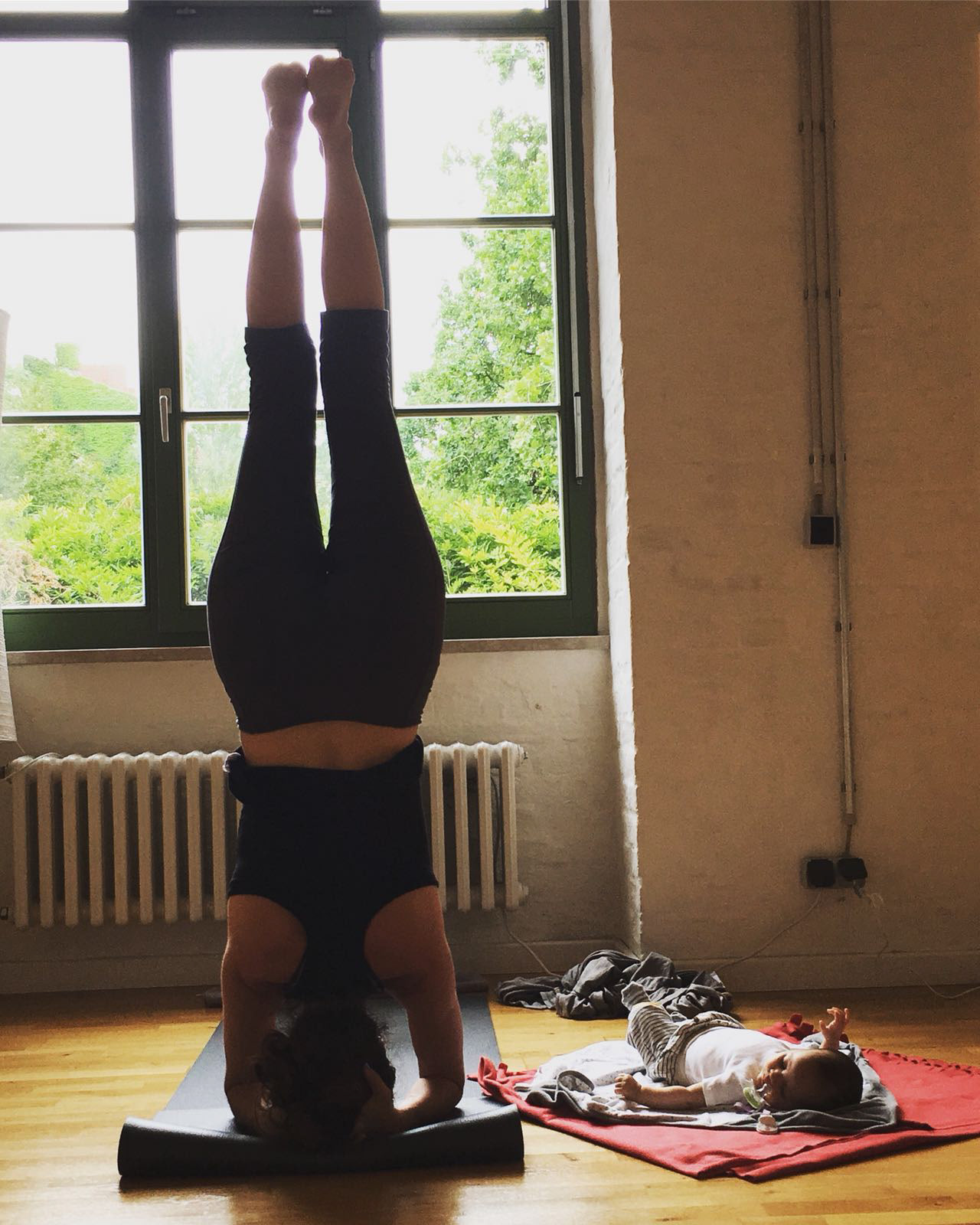
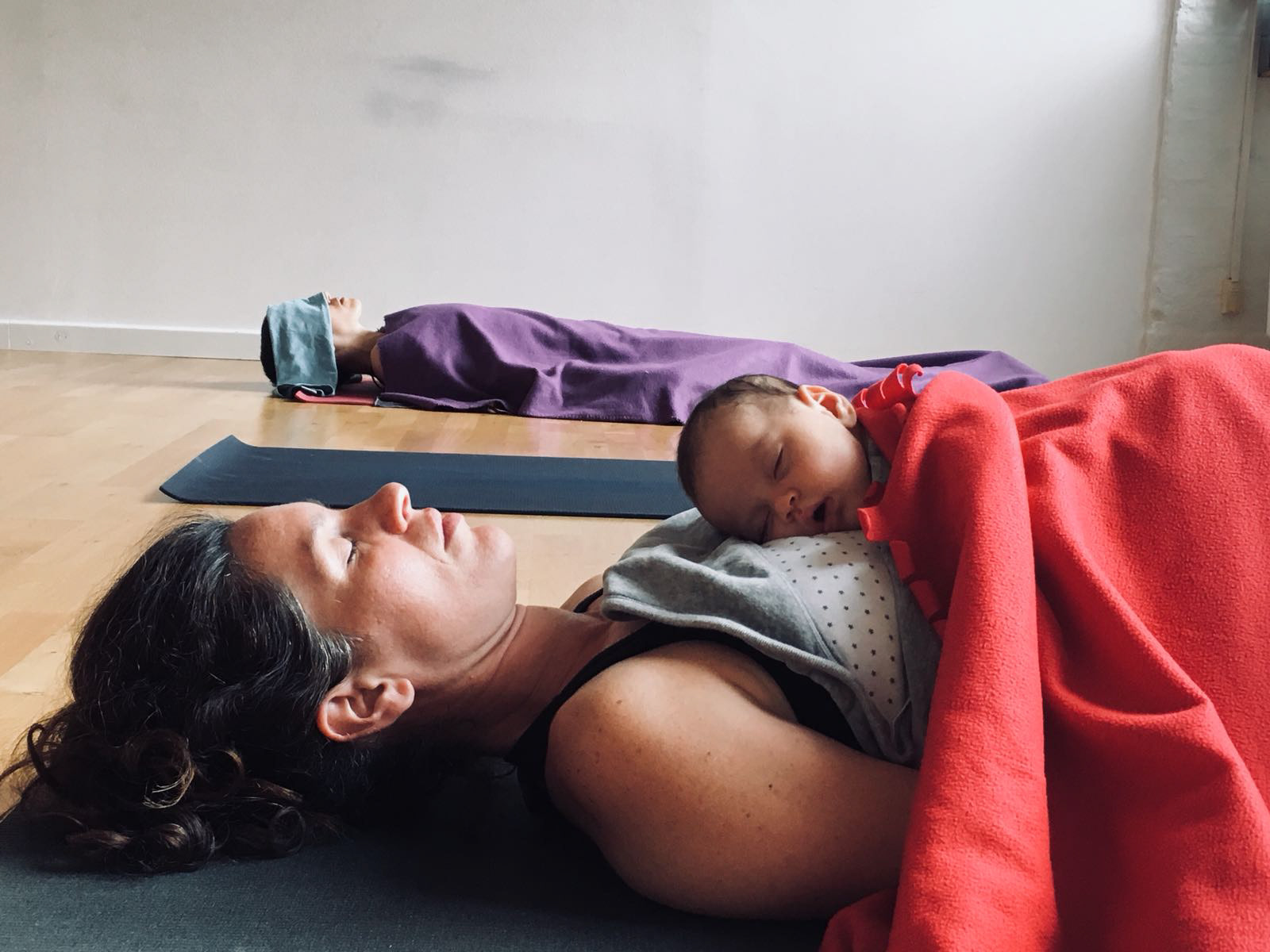
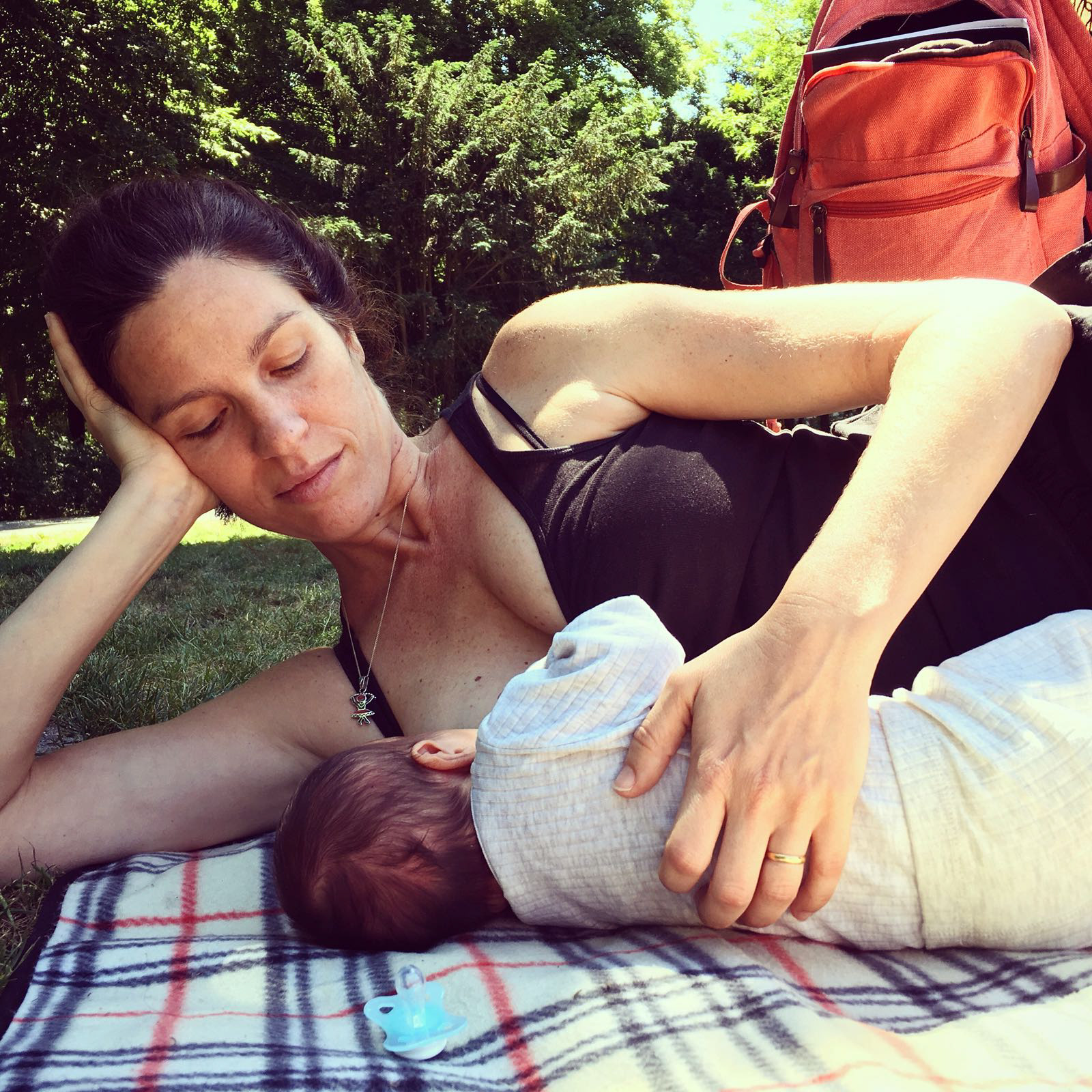
• How was the experience of giving birth?
Surreal, mystic. It was the most spiritual experience I had in my life. I felt a large force, something unstoppable, uncontrollable, powerful breaking through me. It is quite difficult to put in words because being able to give birth implies a huge degree of disconnection-connection. It is a unique experience, a portal. I think there is no other situation where I feel so much resistance in my mind but with literally no place to hide. It is a moment where I could face myself, know my power, my limits. It was a very special moment with my partner, flooded with love. It's pretty amazing, magical that we can experience something like that. And starting motherhood by experiencing birth like this is a way to give back to women power, confidence and strength to be able to face the enormous task of raising a child, to find the strength to stay awake the whole night with a screaming baby. The strength to face an angry child with love and patience. And what I feel society doesn’t get (or doesn’t want to allow) is that by doing so you can change future society itself. Imagine the society you can create raising children with fearless mothers!
• Why do you think the society in which we live, denies women the power and pleasure of the moment of childbirth?
Fear. This society wants us to live in fear. Fear of dying, lacking, failing, suffering.
• How was the postpartum with Sara? How do you imagine the one that is to come?
I did not feel I had a postpartum period with Sara. I didn't know what it was exactly, I just thought you could get depressed and I did not want that. The truth is that I did not rest that much; I was anxious to recover my body, my life, my activities, my private personal space. I did not push myself either. In fact, there were several things I wanted to do and I restrained myself a lot! Because it had been so hard for me to slow down in the pregnancy, as soon as I could, I went back to do everything I love. I am quite restless, of a rather fiery and very determined nature, it was difficult for me to connect with something restorative. Seeing it now seems crazy to me but I do not judge it, I understand it, I understand where it came from, the process that was part of it. Today I am in another place and also this postpartum finds me wanting to take care of myself, to pamper me, to respect me, to nourish myself. Today I understand the importance of being able to rest, to respect the different moments, the different phases, not to hurry them. Today I understand that nothing ever will be the same, so I am not in a hurry to "return" to because I know there is nothing to return to. Only something new to discover. I want to rest and recover so I can be ready for my new life, for my new self. I want to not miss those beautiful first weeks of my baby, I do not want to feel pressured. Certainly not by me.
• What does it mean to you, as a woman, to have a daughter?
That's something I'm discovering just now, with my 4 year old daughter. I was not so enthusiastic about the idea of having a baby girl and I feel that it is a feeling quite inserted in society in general. And to top it off, I had a beautiful and girly girl who loves dresses, bows, princesses and pink color. And at first, I tried to fight it as much as I could but luckily I understood that this was also imposing my own desires on her and that if I wanted to teach her the immense power of being herself I had to respect all her choices. Even the princesses! Today she makes me question everything I believe in and I will be eternally grateful for that. She made me rethink femininity, what vision of the female body I want to teach her. I love having a woman daughter, it is very healing.
• What advice would you give your daughter in the future, if she decides to have children?
I hope to be able to accompany her in all the processes of her life without interfering, it is something that I would really like to achieve. I want to be able to listen her deeply rather than give her advices. I want to be able to give her a space of refuge, support, without judgments.
As an ashtanga yoga teacher, how do you accompany women who practice pregnant and with newborn babies?
I treat pregnant women as I treat all the other practitioners, as unique people. That is the wonder of teaching the mysore method, every person that enters through the door is different. Because I honestly believe that the practice of Ashtanga Yoga is for everyone, for all types of bodies, in different states. This practice can accompany you in all the stages of your life if you practice with the correct intention. For me it is a self-knowledge tool, it sustains me, it is my anchor and it includes much more than the asana. I can always at least sit and observe my breath.
It is important for me not to impose anything on them. Allow them to walk their own path of discovery. Which is pretty much how we teach everyone else at the shala! This is how my teachers taught me. I got to practice with Matthew and Carla Vollmer in my first pregnancy and with Sharath Jois in Mysore in the second one. I do not like to forbid them anything or tell them what they should do. Obviously, there are guidelines, different for beginners than for experienced practitioners. I share my knowledge of what is beneficial and what is definitely not, but I leave the responsibility of their practice to each woman. For me it is important that they can make their own decisions, make mistakes, try, there is a well of immense wisdom right there. And pregnancy is such an overwhelming period nowadays, where everyone has something to say and it makes it difficult to silence all that external noise. That's why it's important for me to provide a place of silence, of connection, of learning to listen to your own body and your baby.
And I simply love when they resume their practice. I greatly appreciate, from my own experience, the effort they make to come to the shala. It's hard to go back to practice, find the time, the way, but I really enjoy accompanying women in that process of rediscovering their new body, their new self, their new strength they find because of that. I know it's hard at first but I love accompanying and witnessing that process.
I treat pregnant women as I treat all the other practitioners, as unique people. That is the wonder of teaching the mysore method, every person that enters through the door is different. Because I honestly believe that the practice of Ashtanga Yoga is for everyone, for all types of bodies, in different states. This practice can accompany you in all the stages of your life if you practice with the correct intention. For me it is a self-knowledge tool, it sustains me, it is my anchor and it includes much more than the asana. I can always at least sit and observe my breath.
It is important for me not to impose anything on them. Allow them to walk their own path of discovery. Which is pretty much how we teach everyone else at the shala! This is how my teachers taught me. I got to practice with Matthew and Carla Vollmer in my first pregnancy and with Sharath Jois in Mysore in the second one. I do not like to forbid them anything or tell them what they should do. Obviously, there are guidelines, different for beginners than for experienced practitioners. I share my knowledge of what is beneficial and what is definitely not, but I leave the responsibility of their practice to each woman. For me it is important that they can make their own decisions, make mistakes, try, there is a well of immense wisdom right there. And pregnancy is such an overwhelming period nowadays, where everyone has something to say and it makes it difficult to silence all that external noise. That's why it's important for me to provide a place of silence, of connection, of learning to listen to your own body and your baby.
And I simply love when they resume their practice. I greatly appreciate, from my own experience, the effort they make to come to the shala. It's hard to go back to practice, find the time, the way, but I really enjoy accompanying women in that process of rediscovering their new body, their new self, their new strength they find because of that. I know it's hard at first but I love accompanying and witnessing that process.
• What books do you recommend to other women?
In general, I prefer not to recommend books because of this that I discovered of not encouraging to investigate outside so much, rather to be able to leave a little space open to intuition, to what emerges within oneself, to experimentation itself. But the reality is that I am an avid reader and researcher and there are several books that are very inspiring for me. Natural Gynecology by Pabla Pérez San Martín (in spanish only); Woman's Body, Woman Wisdom by Christiane Northrupe; The Fourth Trimester by Kimberly Ann Johnson; Yoga Sadhana for Mothers, interviews with ashtangis women compiled by Sharmila Desai and Anna Wise and one not only for women but I love, Practicing Peace by Pema Chodron.
• What women inspire you daily?
Carla Vollmer is a person who inspires me as a woman, as a mother, as a friend, as a teacher. It is a very important reference for me, a person that I carry very deep in my heart and I feel lucky to say that it is my friend and teacher. And she is a real woman, without pretensions, without poses, honest, loving and extremely generous. Pema Chodron is another woman that I learned a lot from. My Ayurvedic doctor, Carmen Frigerio, who accompanied me in my first pregnancy, was very inspiring and also very dear to me. And most of all, many of my friends inspire me day by day, I feel lucky and grateful to be surrounded by women like these. I am very happy to see younger women with all this process so clear, so defined, something that took me years but I feel that there is a new generation arousing, that is not ashamed to feel, women who do not compete, who support each other. It is inspiring and hopeful.
• What would you say today to your past self, at the time of having the first menstruation?
Do not be afraid, nothing ends there. It is not something you have to hide or be ashamed of. I had no idea that there was so much information there, all I knew about my cycle was that it was related to my fertility and being so young, I was terrified of it. I did not want to know anything with that and the pill was the magic solution... but in the meanwhile I suffered the hormonal changes, believing I was driving crazy once a month, but intuiting deep inside me that what was exploiting at that moment hid the truth.
I would tell her that on the contrary, a portal opens up to a new world, of connection, unique, magical. I tell my daughter we have "magic bellies" because that's the way it is, we are witches.
